Posts Tagged ‘International PEN Foundation’
PEN Journey 7: PEN in Times of War and Women on the Move
PEN International celebrates its Centenary in 2021. I’ve been active in PEN for more than 30 years in various positions and now as an International Vice President Emeritus. With memories stirring and file drawers of documents and correspondence bulging, I am a bit of a walking archive and have been asked by PEN International to write down memories. I hope this personal PEN journey will be of interest.
Iraq invaded Kuwait August 2, 1990. When I picked up my 10-year old son from camp in the U.S. that summer and told him what had happened, his first response was: What about Talal and Alec? These were two of his good friends at the American School in London—one was son of the Kuwaiti Ambassador; the other was from Iraq. He quickly understood the consequences. Fortunately, both of his friends had been out of their countries at the time, though I don’t recall Alec returning to the American School that fall. When the bombs dropped on Baghdad in January, the American School went into lockdown. The older students were issued identity cards. The security force around the school multiplied. When Talal came over to play that winter, he was accompanied by two imposing body guards who stayed outside.
Though the fighting in Iraq concluded by the end of February, security in London continued. By the end of March, the war in the Balkans had begun. Both wars brought to a close the honeymoon many felt after the fall of the Berlin Wall.
For PEN, the outbreak of war in Iraq and in the Balkans led to the cancellation of the planned Delphi Congress and to the convening of conferences in Europe and a two-day gathering of PEN’s Assembly of Delegates and international committees in Paris in April 1991. Delegates from 39 PEN centers came together to conduct the business of PEN at the Société des Gens de Lettres de France which occupied the 18th-century neoclassical Hôtel de Massa on rue de Faubourg-Saint-Jacques in the 14th arrondissement of Paris. There were no literary sessions or social gatherings, or the usual simultaneous translation of proceedings. The business was conducted primarily in English with intermittent French, the two official languages of PEN. (Spanish was added a few years later as PEN’s third official language.)
The Gulf War, the ethnic conflict in the Balkans, the aftermath of the Tiananmen Square trials and the ongoing fatwa against Salman Rushdie predominated discussions in Paris and later in November at the 56th PEN Congress in Vienna. The Gulf War had resulted in increased numbers of writers imprisoned and killed in the Middle East and an increase in censorship. Resolutions condemning the detention and imprisonment of writers in Saudi Arabia, Syria, Israel and Turkey passed the Paris Assembly. Little information was available from Iraq. Another resolution in Paris sponsored by the two American centers expressed concern to the U.S. government and all U.N. member states over the restrictions placed on journalists during the war and urged a review of the ground rules for journalists in conflicts.
Turkey and China continued to hold the largest number of writers in prison, as has been the case for most of my 30-year involvement with PEN. At the time the Turkish government had announced an amnesty for approximately a third of the writers, and there was some hope they might release the additional 80, but new laws were also proposed that could be used against writers. In China where 87 cases were reported, the authorities had announced the end of investigations on the leaders of the June 1989 Democracy Movement. Most sentences were lighter than expected with credit given to human rights organizations like PEN who had kept up pressure.
However, this was not the case for Wang Juntao, a 32-year old academic and Deputy Editor of the Economics Weekly newspaper. In a letter to his lawyer published at the time in The South China Morning Post Wang Juntao explained why he had spoken as he had at the trial even though he knew his penalty would be more severe. “…Only by so doing can the dead rest in peace, since on the soil where they shed blood there are still some compatriots who take risks and speak out from a sense of justice in the most difficult circumstances…” His lawyers had been given just four days to prepare his defense. He was sentenced to 13 years in prison with four years subsequent deprivation of political rights for the crime of conspiracy to subvert the government and for carrying out counter-revolutionary propaganda and incitement. His lawyers pressed him not to appeal so his wife had to do so and was given only three days. The appeal was rejected. [In 1994 Wang Juntao was one of the prisoners the U.S. demanded be released as a condition for trade talks. He was released from prison for medical reasons and now lives in exile in the United States where he has studied and received advanced degrees from Harvard University and a PhD from Columbia University. PEN was among the organizations which lobbied for this release.]
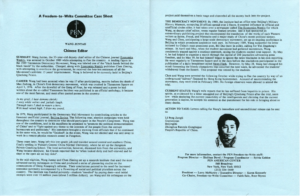
PEN International’s case sheet for Wang Juntao sent by fax and mail in 1990 to centers and members. In 1991 PEN International launched a Rapid Action Network to notify centers and to summarize the cases, actions and advocacy.
During this period PEN through its partnership with UNESCO convened writers in the Middle East and also writers in the Balkans to find common ground and to search out the pylons upon which bridges might be built and to monitor the situation for the writers in the regions. However, because of the Balkan War, it wasn’t possible to hold the meeting with the Yugoslav Centers in Bled as the Slovene Center had proposed. Instead PEN International President György Konrád hosted the gathering in Budapest and followed up with a meeting of South-Eastern European centers in Ohrid, hosted by Macedonian PEN though the Croatian Center wasn’t able to attend. The discussion included the desirability of recognizing the right of conscious objection in time of civil war and the possibility of solving the problem of minorities by allowing multiple citizenship.
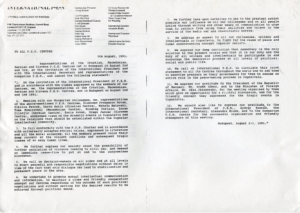
Summary statement of the August, 1991 Conference on the Balkans with all centers from the former Yugoslavia attending except the Bosnian Center, which didn’t come into being until the following year.
In addition to convening dialogues among writers and lobbying on behalf of threatened writers during the Balkan conflicts, PEN also provided financial assistance. Boris Novak, the Slovene Chair of PEN’s Peace Committee and President of Slovene PEN took many precarious trips into war-torn Sarajevo during the almost four-year siege of the city. At one point he reported at least 52 writers and their families were trapped and could only leave if invited to an international peace conference. Slovene PEN planned to host such a conference and invite the writers and their families with the hope the U.N. Peacekeeping Force could provide protection for their exit. He urged other PEN centers to assist in finding residences and perhaps temporary teaching appointments or fellowships for these writers. He also delivered aid to trapped writers, aid gathered from other PEN Centers, donated to the Writers in Prison Committee Aid Fund and to PEN’s Emergency Fund run out of Amsterdam with Dutch PEN.
In an intersection of conflicts, the German and Finnish publishers of Salman Rushdie’s Satanic Verses donated their proceeds from the book to PEN’s Writers in Prison Committee. By the Vienna Congress, Rushdie had lived 1000 days under death threat. PEN continued its defense of Rushdie and its protest against the accompanying violence of the fatwa. The Japanese translator of Satanic Verses had been killed, and the Italian translator badly beaten. (Two years later the Norwegian publisher was shot three times and left for dead.) The bounty had increased on Rushdie, and there was allegedly a hit squad deployed in Western Europe to assassinate him.
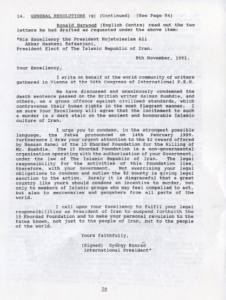
One of many letters sent by International PEN to support Salman Rushdie and to protest the ongoing fatwa.
My personal engagement and memories during this period focused on work with the Writers in Prison Committee and to a lesser extent with the formation of the Women’s Committee, which I supported but which others were driving, and with the establishment of the International PEN Foundation which would be able to receive tax exempt funds for many of these PEN activities. After a discussion of the Foundation’s framework at the Paris Conference, including assurances that the Foundation would not interfere or challenge PEN’s governance, I presented the formal proposal at the Vienna Congress where the Assembly of Delegates approved the establishment of an International PEN Foundation. The Foundation received official charitable status in March 1992 and operated for the next decade until British charitable tax laws changed and a separate foundation was no longer necessary.
Also at the Vienna Congress the Women’s Network, which had formed at the Canadian Congress in 1989, gained approval as a standing committee of International PEN with assurances that men and women were welcome and would work together. Meredith Tax, a chief strategist and one of the founders, explained the committee would involve more women in the work of PEN at all levels and address problems that particularly affected women writers in developing countries and would enable women to know each other’s work, much of which was not translated. “The Women’s Committee will be a force to strengthen, not weaken PEN,” she assured the Assembly.
The eventual governance of the Women’s Committee included PEN members from around the world and its chair rotated to different regions. Each of PEN’s standing committees had its own governing structure. The Women’s Committee was unique in its inclusiveness, which had its own challenges, but which foreshadowed a more inclusive governing structure for PEN International. Twenty-eight PEN centers signed up for the committee with 70 delegates and members, including men, attending the initial meeting.
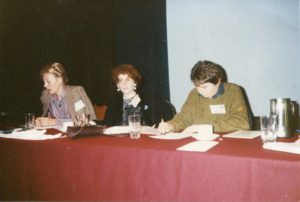
L to R: Moniika van Paemel, (Belgium Dutch-speaking PEN) and Meredith Tax (American PEN) at Women’s Committee Planning meeting at Canadian Congress, 1989
At the time International PEN’s leadership was all male. In its 80-year history International PEN had never had a woman President and only one woman International Secretary and few women as Committee chairs though in many centers of PEN there was a growing balance of men and women members and leaders. In 2015 novelist and poet Jennifer Clement was elected the first woman President of International PEN.
Next Installment: PEN Journey 8: Thresholds of Change…Passing the Torch
PEN Journey 5: PEN in London, Early 1990’s
PEN International celebrates its Centenary in 2021. I’ve been active in PEN for more than 30 years in various positions and now as an International Vice President Emeritus. With memories stirring and file drawers of documents and correspondence bulging, I am a walking archive and have been asked by PEN International to write down memories. I hope this personal PEN journey might be of interest.
I moved to London where International PEN is headquartered in January 1990 from Los Angeles. I came with my husband and my 9 and 11-year old sons who rarely wore long sleeves, let alone coats or jackets. A few weeks into our resettlement, London spun in its first major tornado of the decade with hail and winds whipping at hurricane force and cars and trees toppled and a few rooftops airborne. The weather was highly unusual for London. Our family, who was still in temporary housing, took the unwelcome weather as a welcome of sorts, signaling that we might just be in for an adventure. Did you see that roof flying…!
There were still complaints: only four television channels, movies strictly restricted by age and when you did get into a theater, you had assigned seats, milk that went bad in a day, delivered on the stoop in glass bottles, a refrigerator that barely held enough food for a day, appliances that came without plugs…And where was the sun?
Yet the magic of the city quickly affected us all. My youngest son discovered the best skateboarders lived in London, and London (and England) was full of history and castles, and my oldest son, who was soon moved ahead a grade in school because he was highly talented in math, met students from all over the world in his class at the American School, a few of whom talked and imagined in his orbit. He was put on the rugby team to help socialize and the following year on the wrestling team, where he eventually, as an adult and by then dual citizen, wrestled for Great Britain in the Olympics.
For me, finding home in London meant connecting with PEN, both International PEN and English PEN. Writers can be members of more than one PEN center, though can vote with only one center. I’d begun my PEN journey in Los Angeles at PEN Los Angeles Center (changed to PEN USA West). When my second book was published, I also joined PEN American Center, based in New York, and now in London. I joined English PEN, the oldest and the original PEN center since the organization was founded by British writers in 1921. International PEN and English PEN had separate offices, but the Administrative Secretary of International PEN and the General Secretary of English PEN were longtime friends and actually lived next door to each other in Fulham. The two organizations worked independently, yet closely together.
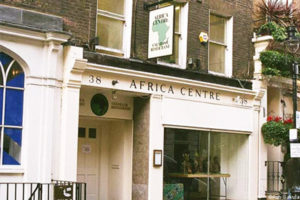
Early on I visited International PEN’s office, headquartered in Covent Garden on King Street in the Africa Centre. To get to the office at the front of the house, you had to go through the Africa Book Shop on the first floor. PEN had two rooms with several desks in the larger room with papers stacked everywhere. There was a filing cabinet and a photocopier and just enough space to squeeze between to get to the desk looking onto the street.
International PEN was kept functioning by the stalwart and efficient Elizabeth Paterson, who I don’t recall getting angry at anyone even as the work piled on and people around the world in PEN centers asked more and more of her, including the smart, demanding International Secretary Alexander Blokh. Alex flew in every month, usually from Paris, and displaced the Writers in Prison Committee’s small staff from the second office in order to conduct the business of PEN around the world. Alex was a former UNESCO official, and at that time UNESCO was one of International PEN’s major funders. When UNESCO was formed, according to Alex, it established organizations for the various arts, but when it came to literature, it recognized that PEN already existed, and so its outreach and funding funneled through PEN. Over the years PEN has grown more and more independent of UNESCO support.
Elizabeth, with her quiet intelligence and subtle humor, managed to keep International PEN running day to day while Alex developed the literary and cultural programs with the centers and the standing committees—the Translation and Linguistic Rights Committee, the Peace Committee, and the Writers in Prison Committee (WiPC). The WiPC tended to operate more autonomously with its elected chair Swedish publisher Thomas von Vegesack and before him Michael Scammell. When I arrived in London, there was also a petite gray-haired woman Kathleen von Simson, a volunteer who’d helped manage the Writers in Prison Committee work for years. PEN had recently hired a paid Coordinator Siobhan Dowd whose task was to professionalize the human rights work, and Siobhan hired researcher Mandy Garner. The two of them worked in the tiny second room. Siobhan eventually crossed the ocean to head up the Freedom to Write program at American PEN.
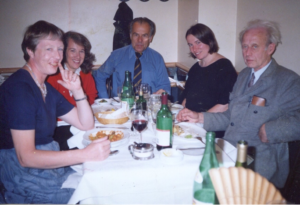
Fall 1990. Left to right: Elizabeth Paterson, Joanne Leedom-Ackerman, Per Wastberg (former PEN International President), Siobhan Dowd, Bill Barazetti
Also finding space on King Street was the Assistant Treasurer (and later International Treasurer) Bill Barazetti, who at that time was an unsung hero from World War II. It was later publicized that Bill had smuggled hundreds of Jewish children out of Prague with false identity papers he arranged. He was a wiry gray-haired former intelligence officer who’d also interrogated captured German pilots. Alex Blokh, whose pen name was Jean Blot, was an exiled Russian Jew, a lawyer and had also been active in the French Resistance during World War II, and Elizabeth had endured the bombings in London during the War. Though it was 1990 and the Berlin Wall and other barriers which had gone up after World War II were now falling, in the PEN office there was still a feeling of that post-War period, an abstemiousness and a fortitude of the dedicated amateur who knew what sacrifice was and endured no matter what. I couldn’t articulate the atmosphere at the time, but as an American born after the war, grown up in Texas and moving to London from Los Angeles, I felt the contrasts and the constraints. One small incident I remember was when a donation for a baby gift for the newly hired Sara Whyatt was being gathered. I offered £20 for the pot and was told by Elizabeth, “Oh, no, that amount would embarrass her.” The concept of anyone being embarrassed by a pooled £20 contribution silenced me. I put in £10 instead, still considered a large amount. Because I was new and an American, I tried to listen and learn, but I understood expectations and horizons were different.
A generation of my own joined the office in the persons of Jane Spender, a former editor, smart and literary who worked with Elizabeth and later Gilly Vincent, who took on the part time assignment to help with development work for the eventual International PEN Foundation. (see PEN Journey 4) Later Gilly became General Secretary of English PEN. I quickly learned to respect the differences; the American way was not the British way. I remember a fundraising event in which there must have been 20 major English writers featured and attending, and the ticket price was £25. The PEN Foundation netted perhaps £3000 that evening. In New York with that line up of writers, I am confident American PEN would have added at least one, if not two, zeros to the proceeds, but we were in London, and the event was not a glittery affair but more like a large family gathering of literary friends at someone’s home.
PEN International moved its offices in 1991 from Covent Garden to Charterhouse Buildings in Clerkenwell nearer the City of London. The new offices were on the top floor of a bonded warehouse, and I never met anyone who didn’t arrive breathless after climbing the steep four or five flights of stairs. There was no elevator, but there was an outside hoist where PEN could load supplies and mail out the window and drop or raise these to and from the ground, preferably not in the rain. Elizabeth set the door code as the beginning and ending years of World Wars I and II, an 8-digit code everyone could remember. The offices at Charterhouse Buildings were spacious compared to King Street—two large airy rooms, one for the Writers in Prison Committee and one for all the other work of PEN, a spacious entry room used as a meeting area and a smaller private office where the International Secretary could work or small meetings could be held. All the rooms were painted “magnolia”–a creamy white/yellow color. The full-time staff by then was, I think, three, along with four or five part-time staff and volunteers, including Jane Spender, Peter Day, editor of PEN International magazine, Bill Barazetti and later his daughter Kathy and occasional interns.
When Siobhan prepared to leave for the U.S., Thomas asked me to interview candidates with him for her replacement. Between interviews he explained to me his view of England in the constellation of Europe by a story of when a fog settled over the English Channel and the headline in a British paper announced: Continent Isolated. Later, when the Channel Tunnel finally connected Great Britain to France in 1994, I sent Thomas a note and a copy of the headline from a British paper: “You’ll be glad to know, Thomas: Continent No Longer Isolated, the headline read.
Thomas and I agreed on the best candidate, and PEN hired Sara Whyatt as the new Program Director of the Writers in Prison Committee. Sara came to PEN from Amnesty and set about further professionalizing WiPC’s research and advocacy work. Sara and Mandy split up the globe, with Mandy focusing on Latin America and Africa.

Across London in Chelsea, English PEN rented offices from the London Sketch Club on Dilke Street where it held weekly literary programs, a monthly formal dinner, an annual Writers Day Program honoring one writer—Arthur Miller, Graham Greene, and Larry McMurtry were three I recall—and a mid-Summer Party. The literary programs and dinners, held in the Sketchers studio and bar, featured writers such as Michael Ignatieff, Germaine Greer, Michael Holroyd, Jan Morris, Rachael Billington, A.L. Barker, Penelope Lively, Andrew Motion, A.S. Byatt, Margaret Foster, William Boyd, Margaret Drabble, Iris Murdoch, and frequently Antonia Fraser, Harold Pinter and Ronald Harwood, just to name a few.
When I moved to London and joined English PEN, the General Secretary Josephine Pullein-Thompson, a stalwart writer/member, managed the organization and kept it running with minimal staff and with active members. Author of young adult novels, Josephine wrote books about young girls and horses. When I close my eyes, I can hear her gruff voice and see her square face and think of horses. She was pragmatic and no-nonsense and what I think of as the epitome of a certain era of British resolve. She befriended me early, I think, because I was focused on a task—getting charitable status for PEN International which ultimately allowed English PEN to claim the same. It was Josephine years later who nominated me as a Vice President of International PEN.
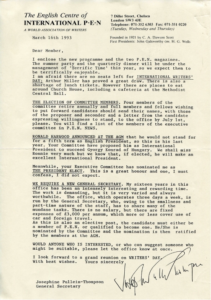
Members of English PEN were passionate about PEN’s mission to protect and speak up on behalf of writers under threat in oppressive regimes. Among activities, members, including notable British writers such as Ronald Harwood, Harold Pinter, and Antonia Fraser, who were good friends, and Moris Farhi, a Turkish/British novelist with a great beard, great girth and great heart, who later succeed me as Writers in Prison Chair, and dozens of other English PEN members held vigils, often by candlelight. They protested outside embassies of countries where writers were in prison. They got press coverage and ultimately helped secure the release of writers, particularly those in former Commonwealth countries like Malawi.
Malawian poet Jack Mapanje recalled his spirit lifting when he saw the press clippings of Harold Pinter and others protesting outside the Malawi Embassy in London on his behalf. When he was released, he resettled in England and joined English PEN.
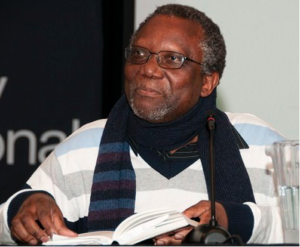
Jack Mapanje
Next Installment: Freedom and Beyond…War on the Horizon
PEN Journey 4: Freedom on the Move: West to East
PEN International celebrates its Centenary in 2021. I’ve been active in PEN for more than 30 years in various positions. With memories stirring and file drawers bulging, I am a bit of a walking archive and have been asked by PEN International to write down memories. I hope this personal PEN journey will be of interest.
I have attended 32 International PEN Congresses as president of a PEN Center, often as a delegate, as Chair of the International Writers in Prison Committee, as International Secretary and now as Vice President. The number surprises me when I count. The Congresses have been held on every continent except Antarctica. Many were grand affairs where heads of State such as Vaclav Havel in Czechoslovakia, Angela Merkel in Germany, Abdoulaye Wade in Senegal greeted PEN members. Some were modest as the improvised Congress in London in 2001 when PEN had to postpone the Congress planned in Macedonia because of war in the Balkans. PEN held its Congress in Ohrid, Macedonia the following year. At these Congresses writers from PEN centers all over the globe attended. Today PEN International has centers in over 100 countries.
Among the more memorable and grand was the 54th PEN Congress in Canada, held in September 1989 when PEN still held two Congresses a year. The Canadian Congress, staged in both Toronto and Montreal by the two Canadian PEN centers, moved delegates and participants between cities on a train. The theme—The Writer: Freedom and Power—signaled hope at a time when freedom was expanding in the world with writers wielding the megaphone.
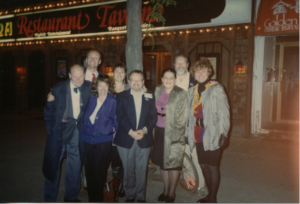
54th PEN Congress in Canada, 1989. Front row: WiPC chair Thomas von Vegesack, Joanne Leedom-Ackerman and PEN USA West Executive Director Richard Bray. Back row: Digby Diehl (right) and other delegates.
The literary programs included luminary writers from over 25 countries, including Margaret Atwood (Canada), Chinua Achebe (Nigeria), Anita Desai (India), Tadeusz Konwicki ( Poland), Claribel Alegria (El Salvador), Margaret Drabble (England), Michael Ignatieff (Canada), Ama Ata Aidoo (Ghana), Derek Walcott (St. Lucia), John Ralston Saul (Canada), Duo Duo (China), Harold Pinter (England), Tatyana Tolstaya (USSR), Alice Munro (Canada), Wendy Law-Yone (Burma), Larry McMurtry (USA), Emily Nasrallah (Lebanon), Yehuda Amichai (Israel), Maxine Hong-Kingston (USA), Michael Ondaatje (Canada), Nancy Morejn (Cuba), Jelila Hafsia (Tunisia), Miriam Tlali (South /Africa), and dozens more, and other writers listed in absentia such as Vaclav Havel (Czechoslovakia) and writers from Iran, Turkey, Hungary, South Africa, Morocco and Vietnam. PEN members and delegates attended from at least 57 PEN centers around the world.
The new PEN International President Rene Tavernier, a poet who had been active in the French resistance during World War II, hailed the importance of the writer’s role in upholding freedom of expression around the globe and in confronting central power which restricted individual voices. PEN’s and the writer’s only weapon was the word, he said, and the word must be used in service of “creative intelligence, human rights, lucidity and hope.” Though the twentieth century had seen “the growth of new and atrocious ideologies with their police forces and concentration camps, they could not change the spirit of man, which is what PEN defends,” he said. PEN’s concern was literature and ideas and conversations among writers, who may not always agree.
A goal of the Congress was to expand dialogues among people, especially in Muslim communities in the wake of the fatwa and to expand PEN’s reach into Africa, the Middle East and Latin America. Today PEN centers in those areas have grown exponentially with 33 centers in Africa and the Middle East and 19 centers in Latin America, though participation from these centers in global forums still remains challenging.
Another outcome of the Congress was the formation of the PEN Women’s Network, a precursor to the Women’s Committee established as a standing committee of PEN two years later at the 1991 Vienna Congress. The Canadian Congress organizers had balanced literary panels and discussions among men and women, a response to the growing voice of women in PEN and to the 1986 New York Congress where men dominated the forums. Some opposed a Women’s Committee, including English PEN which voiced concern that it would fragment and divide members when the goal of PEN was to bring people together. English PEN already operated under a guideline that balanced men and women in leadership. PEN International Vice President Nadine Gordimer wrote that she had “more pressing obligations here, at home in South Africa, towards the needs of both women and men who are writers under our difficult and demanding position, beset by censorship, harassment, and lack of educational opportunities common to both sexes.” But she added that she hoped if a committee did form, it would be in touch with all South African writers.
PEN USA West presented a resolution on South Africa at the Congress, protesting the arrest and treatment of a number of writers, including our honorary member. The resolution passed unanimously in the Assembly of Delegates.
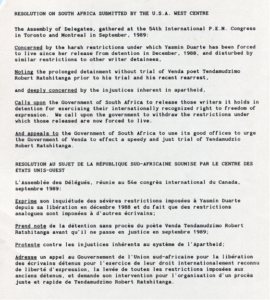
My fellow delegate and I also joined American PEN as well as Canadian PEN, Hong Kong and Taipei PEN in a resolution protesting the “slaughter of Chinese citizens peacefully assembled in and around Beijing’s Tiananmen Square” three months before and the arrest of writers, including Liu Xiaobo and over 20 others. It was feared some of the China PEN members might be under threat. Neither the China Center nor the Shanghai Center were present at the Canadian Congress, but they had been in touch with PEN International. In an official communication the Shanghai Center protested that China was being slandered abroad. Representatives from the two Chinese Centers had demanded an apology from PEN International because poet Bei Dao had been allowed to address the Maastricht Congress (see PEN Journey 3) and they continued to argue that PEN’s main case Wei Jingsheng was not a writer. An apology was not offered, and the resolution protesting the killings and arrests after Tiananmen Square passed with one abstention. Delegates from the China Center and Shanghai Center didn’t return to a PEN Congress for the next two decades, but in the intervening years, individual centers and members such as Japanese writers stayed in touch. In 2001 an Independent Chinese PEN Center (ICPC) formed and gave a place for Chinese writers inside and outside of China to communicate with discussion and debate on freedom of expression and democracy. PEN currently has more than half a dozen centers of Chinese writers, including the China, Shanghai, ICPC, Taipei, Hong Kong, Tibet, Uyghur, and Chinese Writers Abroad centers.
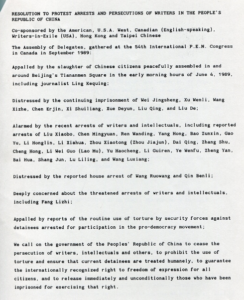
The challenge for PEN has always been how best to use its formal resolutions, written in the language of the United Nations. These are passed then directed to the respective governments, to United Nations forums and to embassies and officials in the countries where PEN has centers and to the media. The effort begins at the PEN International office and then fans out through the centers. The impact of the resolutions vary according to country and to the direct advocacy efforts. However, the climate for such resolutions has altered over the years, and it is an ongoing question what is the most impactful method for effecting change.
At the Canadian Congress the situation in Myanmar/Burma was also highlighted. Our center, along with Austrian, Australian (Perth), and Canadian centers presented a resolution protesting the slaughter of Burmese citizens and the wholesale arrests and imprisonment without trial of citizens, including writers, after the imposition of martial law. I met one of these writers—Ma Thida—in London years later after PEN had advocated aggressively for her release. She’d spent almost six years in prison. A physician, writer and editor and an assistant for Aung San Suu Kyi, she remained committed to freedom for her country. It took another 15 years before the Myanmar government eased restrictions and a civilian government took over. When the political situation in Burma/Myanmar began to open, Ma Thida, Nay Phone Latt and other writers, many of whom had been in prison, formed a PEN Myanmar Center which joined PEN’s Assembly at the 2013 Congress in Reykjavik, Iceland. Ma Thida was its first president, and she now serves on the International Board of PEN.
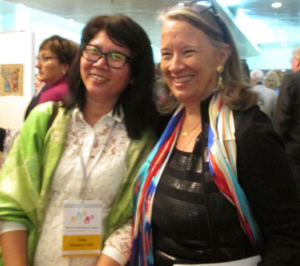
Ma Thida and Joanne Leedom-Ackerman at the PEN Congress in Bishkek, Kyrgyzstan in October 2014
For me, the outward facing Canadian Congress mirrored my own preparation for moving with my family to London three months later in January 1990. It was a fortuitous time to live in Europe as Eastern Europe was opening to the West. Six weeks after the PEN Congress, East Germany announced that its citizens were free to cross into the West, and the Berlin Wall began to crumble figuratively and literally as citizens used hammers and picks to knock down the looming concrete structure. In fall 1990, I took my sons, ages 10 and 12, to East Berlin, and we too climbed up on ladders with metal rods and knocked down the wall, chunks of which we still have.

Joanne and sons Elliot and Nate at the Berlin Wall, Fall 1990
At the Canadian Congress, PEN International’s Writers in Prison Committee (WiPC) Chair Thomas von Vegesack asked that a sub-committee be formed to assist in fundraising. Eight centers—Australian (Perth), Canadian, Swedish, Norwegian, West German, English, American and USA West agreed to help. Because I was moving to London where PEN International was headquartered, Thomas asked if I would head the effort. I told him I wasn’t able to do so but agreed to take on the interim position and help him find a chair and then agreed to take on the task of getting PEN International charitable tax status. I assumed the latter mission would be fairly straightforward, a matter of finding the right law firm to assist. Little did I know the complications of British charitable tax law. Eventually Graeme Gibson, president of PEN Canada, novelist and partner of Margaret Atwood, agreed to head the development effort.
After I arrived in London, I found a law firm. Charitable tax status would relieve PEN of tax bills it found hard to pay and also help with fundraising, but so far PEN had not been able to secure the charitable status. Thomas and I, along with the International Secretary Alexander Blokh, Treasurer Bill Barazetti and Administrative Secretary Elizabeth Paterson met frequently at the PEN International offices at the top of four (or was it five?) very steep flights of stairs in the Charterhouse Buildings where we worked on what turned out to be a two-year project that included the establishment of the International PEN Foundation. The Foundation was allowed to raise tax-exempt funds for the “charitable” work of PEN which could not include perceived “political” work, but only the “educational” aspects.
It took a young American who didn’t know it was impossible to do what we have not been able to do, Antonia Fraser said to me as she joined the first board of the International PEN Foundation in 1992. In a way she was right for I had no idea the complexity of British tax law, quite different than America’s. I wasn’t prepared for the sets and sets of documents and negotiations, the time required to set up a separate organization; on the other hand, the effort opened up the workings of PEN International to me and introduced me to friends I’ve maintained over the decades who also worked on the project. On the Foundation board with me were a majority of British citizens (and PEN members), including Antonia Fraser, Margaret Drabble, Buchi Emecheta, Andre Schiffrin, Christopher Sinclair-Stevenson and later Ronald Harwood as well as a few other international members, PEN’s International Secretary, Treasurer and the new PEN President Gyorgy Konrad.
Harold Pinter’s play Moonlight premiered as the first fundraising event of the International PEN Foundation on October 12, 1993 at the Almeida Theater. Dramatically, the lights of the theater burnt out just before the performance, and the play was performed by candlelight.
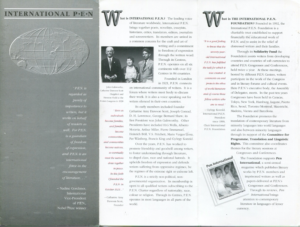
First International PEN and PEN Foundation brochure.
Next Installment: PEN Journey 5: PEN in London, Early 1990’s